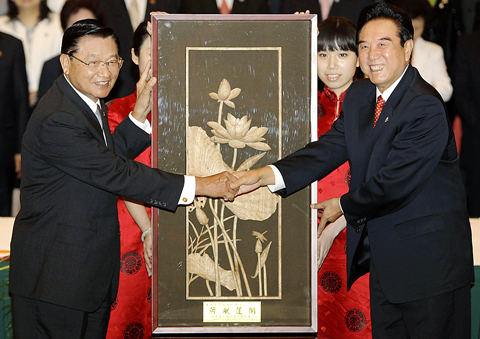|
Taiwan, China sign trade pact
DONE DEAL: Chinese Vice Minister of Commerce Jiang Zengwei called on the
Democratic Progressive Party to refrain from 'manipulating the signing of the
ECFA'
By Flora Wang
STAFF REPORTER , CHONGQING, CHINA
Wednesday, Jun 30, 2010, Page 1

Taiwan’s Straits Exchange Foundation Chairman
Chiang Pin-kung, left, shakes hands with China’s Association for Relations
Across the Taiwan Strait Chairman Chen Yunlin in front of a gift which Chiang
presented to Chen after the ECFA signing ceremony in Chongqing, China,
yesterday.
PHOTO: REUTERS
Taiwan and China yesterday wrapped up the fifth round of cross-strait
negotiations by signing the landmark, yet controversial, Economic Cooperation
Framework Agreement (ECFA). Both sides also signed a copyright protection deal
and resolved to pursue an investment protection pact by the end of the year.
Taiwan’s Straits Exchange Foundation (SEF) Chairman Chiang Pin-kung (江丙坤) and
his Chinese counterpart, Association for Relations Across the Taiwan Strait (ARATS)
Chairman Chen Yunlin (陳雲林), signed and exchanged the documents in a ceremony
held at a hotel in Chongqing, Sichuan Province.
The government has said it will send the pact to the legislature for approval
before it is implemented. According to the document signed yesterday, each side
is to issue a written notice to the other following the completion of the
procedures.
“The deal will take effect the day after both sides receive confirmation,” the
agreement says.
During a meeting between the SEF and ARATS yesterday morning prior to the
signing of the ECFA at 2:30pm, negotiators did not revise the “early harvest”
lists they agreed on during a preparatory meeting in Taipei on Thursday last
week.
Once the ECFA takes effect, the early harvest lists will allow the 539 items on
Taiwan’s list, about US$13.8 billion in exports per year, to receive zero tariff
treatment within the next two years, while Chinese exporters will get a
reciprocal deal on 267 items, US$2.9 billion in exports per year.
Both sides agreed to establish a cross-strait economic cooperation commission,
which will be responsible for follow-up negotiations and supervision of the
agreement.
The ECFA also includes a clause authorizing either party to inform the other
party should the need to suspend the agreement arise, but it does not stipulate
on what grounds a suspension may be proposed.
During the morning meeting, trade officials from both sides agreed that until a
cross-strait trade dispute resolution agreement is forged, the two sides would
attempt to solve any disputes through negotiation and would not refer
controversial cases to the WTO for arbitration.
However, the Taiwanese negotiators, including Vice Minister of Economic Affairs
Francis Liang (梁國新), told their Chinese counterparts that Taiwan would seek
talks on including stipulations in the cross-strait trade dispute resolution
agreement that would entitle the government and Taiwanese individuals to the
right to refer disputes to the WTO for arbitration.
Later yesterday at a press conference held by the SEF, Chiang said Taiwan, as a
member of the WTO, had the right to negotiate free-trade agreements (FTA) with
other nations at any time.
“We also encountered many problems when seeking to join the WTO. We held
bilateral talks with about 30 countries. We solved those problems in the end and
we will have the wisdom to resolve any difficulties [again],” Chiang said.
However, Chinese negotiators were rather more cautious.
“We understand our Taiwanese compatriots’ wish to participate in international
events,” ARATS Vice Chairman Zheng Lizhong (鄭立中) said at a separate press
conference.
Chinese Vice Minister of Commerce Jiang Zengwei (姜增偉) cut in and said: “We can
make reasonable arrangements through cross-strait negotiations under the
precondition of the ‘1992 consensus.’”
Zheng called on the Democratic Progressive Party (DPP) to refrain from
“manipulating the signing of the ECFA.”
“The ECFA is an economic issue. No individual or group should manipulate it for
political gain,” he said.
Chiang said both sides agreed to pursue a cross-strait medical cooperation pact
and an agreement to protect cross-strait investment during a sixth round of
talks.
|
![]()
![]()
![]()